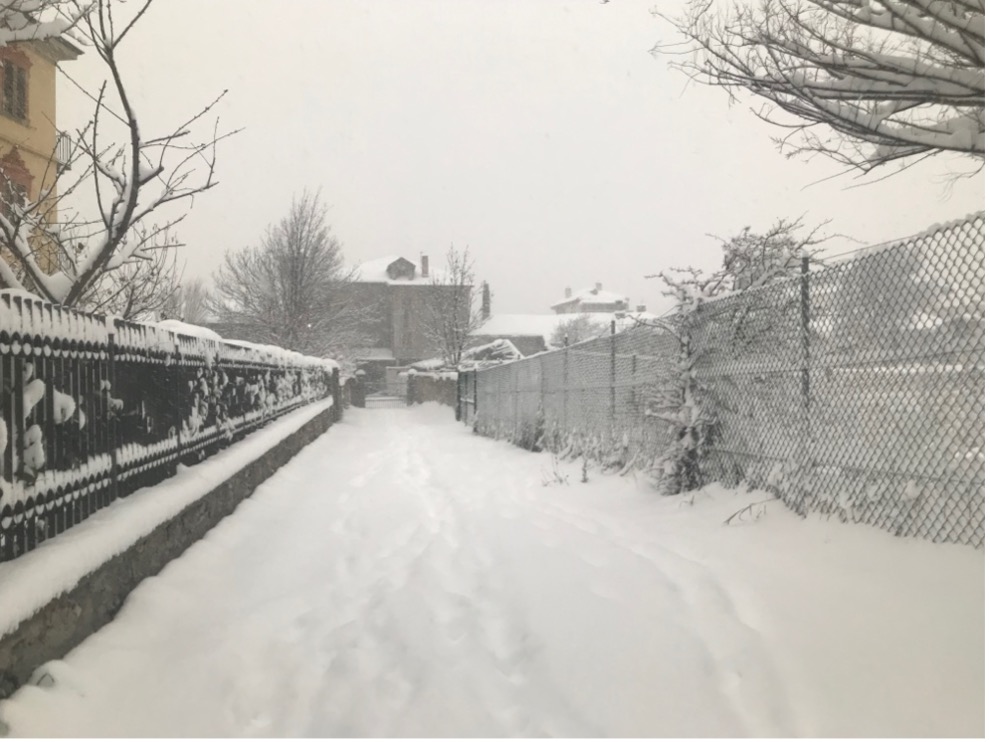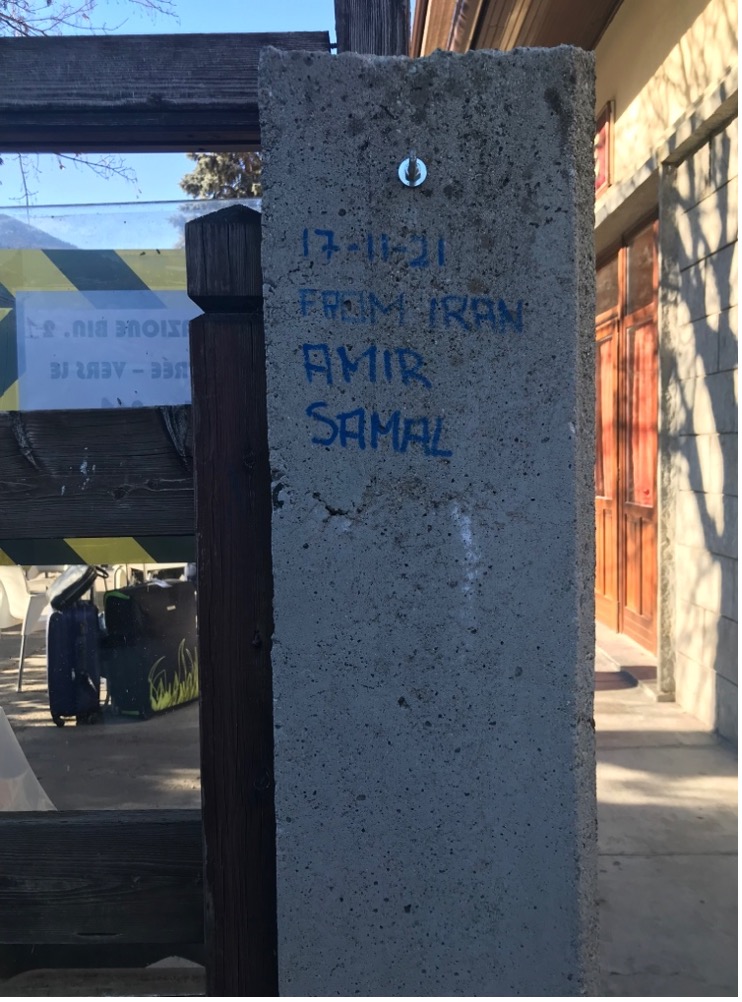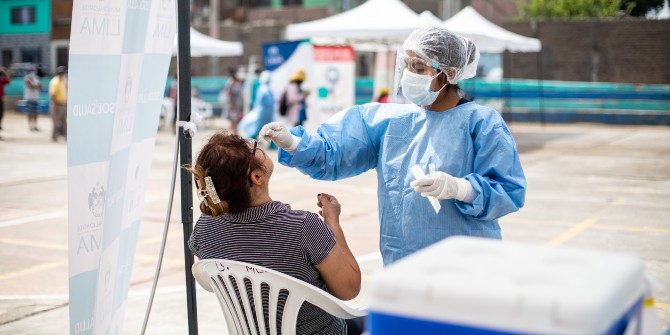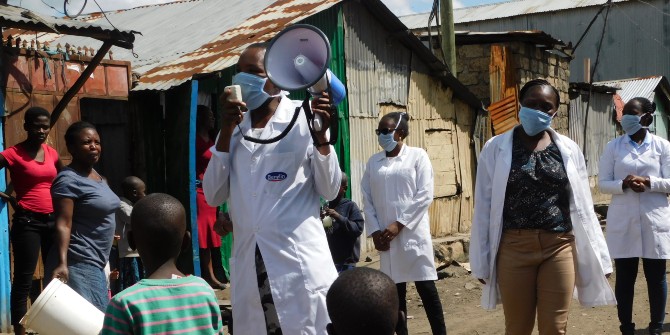Public authorities assume that a reluctance to take the COVID vaccine is due to misinformation. But for migrants trying to cross the border between Italy and France, the reason is simpler: they face an arduous journey across the Alps and do not want to suffer flu-like side-effects from the jab. Costanza Torre (LSE) meets people on the move at a safehouse near the border.
“I got a phone call last week from my mother in Dakar. She told me that my father died of COVID-19,” says Moussa. “But I cannot take the vaccine now, I have to cross the mountains tomorrow. I am not interested in the vaccine here, because I have heard that afterwards you will be weak. Now I can’t, maybe when I arrive to France and rest.”
Moussa is a 15-year-old from Senegal, one of many undocumented migrants passing through the small town of Oulx, which is located at the foothills of the Italian Alps, on their way to the French border. He is traveling with three other young men, one from Cameroon and two from Guinea, whom he met on the way. The four of them arrived by train from Turin only a couple of hours ago, and now sit together in the dormitory room of the Rifugio Fraternità Massi in Oulx, a well-known safehouse located approximately 16 kilometres from the border. Around them, about 20 other men, all traveling by themselves, lie in single beds. Nobody talks much. For most migrants, the Rifugio is a one-night stop to prepare for the Alpine crossing, and people are entirely focused on the journey ahead of them. Some sleep already; many charge and check their phones, catching up with friends on WhatsApp and with football games they missed, while warming their hands over portable radiators. It is the beginning of December, and the temperature outside is already well below zero.
Worldwide, the pandemic has exposed and exacerbated pre-existing inequalities for those who were already living in conditions of uncertainty. In particular, undocumented migrants and people on the move have been over-represented in COVID hospitalisations and death rates. These groups have also been significantly affected by travel restrictions during the pandemic. In 2020, 170 out of 195 countries closed their borders for various lengths of time, deeply affecting movement and leading to widespread and often forceful containment measures along national borders. However, since 2021 travel has resumed, and both the Mediterranean and Balkan routes have once again registered heavy flows of people trying to reach Europe — in some cases, with increases as high as 189% compared to the previous year.
Although they are disproportionately affected by the health burden of the pandemic, undocumented migrants and people on the move have had significantly reduced access to health services, while also being labelled “hard to reach” by health practitioners and policymakers. As governments try to roll out jabs, concerns have been raised about the “vaccine hesitancy” of these groups. However, while global flows of migration have continued throughout the pandemic, little is known about these groups’ attitudes towards the COVID vaccine. The LSE’s Ethnographies of (Dis)Engagements research project set out to investigate the perceptions, understandings and experiences of COVID vaccination of people on the move, and in particular of recently arrived migrants, asylum seekers and refugees located in northern Italy and seeking to cross the border into France.
After France suspended Schengen agreements in 2015, the French-Italian border has become one of the most heavily policed on the continent, especially around the coastal crossing points near the city of Ventimiglia. Consequently, the Alpine route has emerged as a border-zone for migrants. In an attempt to elude police controls, migrants headed to France and other European countries since late 2016 have increasingly chosen to reroute their journey via the Alps. The danger of this journey cannot be underestimated. During the winter, paths can be covered by thick snow and hard to identify. The number of French police patrolling the border has doubled over the past year and as a result migrants are often at risk of getting lost. Repeated push-backs by the French police mean that people frequently attempt the crossing several times before succeeding. Indeed, since 2017, several people have lost their lives attempting the crossing. Consequently, mobile infrastructures of solidarity have emerged on both sides of the border. The safehouse in Oulx, where this research was conducted, is one of the main referral points in the region.

By and large, and even when they do not know the exact road they will take, migrants are acutely aware that the Alpine border crossing is a demanding and potentially dangerous endeavour. Concerns around physical fitness therefore become central to their decision-making processes about COVID vaccines. A common narrative, especially predominant amongst health practitioners and policymakers, identifies lack of awareness and accurate information about vaccination as one of the main causes of vaccine hesitancy. Misinformation and disinformation campaigns, often referred to as the ‘infodemic’, are frequently blamed. But this is not always the case. Asked about the reasons why they had chosen not to receive a COVID vaccine, many people spoke of being worried about the impact that vaccine side-effects would have on their mobility. As one Iraqi man put it: “People are worried that if they get sick [as a consequence of the vaccine], they will have to stop the trip. What if I get a fever? Then I will have to stop and rest.”
People on the move are well aware of the medical implications of the COVID vaccine. The side-effects are anything but marginal for people on the move in Oulx, who see them as potentially disrupting an already challenging journey. They make pragmatic decisions based on these factors.
Anxiety about physical weakness was particularly common among people travelling on their own, especially young men, for whom the prospect of feeling unwell during the journey is particularly daunting. Estimates show that the number of unaccompanied minors undertaking the migratory journey alone is rapidly increasing, and they are likely to have been exacerbated by COVID border closures. When they reach Italy, people on the move often show symptoms of extreme physical and psychological exhaustion. In many cases, this is the result of long periods in overcrowded and unsanitary conditions in refugee camps, and frequent experiences of torture, abuse and intimidation at the hands of police and border authorities. Young men and the unaccompanied are at particular risk of developing long-term health and psychological issues. Doctors working at the Rifugio have observed that these hardships often result in physical harm (e.g., weariness, widespread infections, and frequent injuries to legs and feet due to long periods of walking and a lack of medical care), as well as extreme psychological distress. During a medical visit, for example, a 17-year-old Algerian man showed extensive self-harm scars on his arms and chest, succinctly explaining to the doctors who were struggling to identify the source of his complaints: “It’s the head that is not good”.

After a night at the Rifugio, a small crowd of people wait under a heavy snowstorm for the bus that will take them to Clavière, the last town on the Italian border: from there, they will have to walk. Shaking the snow from the hood of his coat, Moussa, the young Senegalese man quoted at the beginning of this post, explained how for him, the search for a better life in Europe was strongly linked to family obligations and mandates. “I am the first son, I have to be the man of the family and support my five sisters and one brother to go to school, because for us in Africa when you are the first son you have to support… there’s your father and then there’s you.”
For young men travelling alone, the migratory journey often plays a major role in the performance and construction of identity and masculinity. Physical strength and fitness are critical to all undocumented migrants, but especially for this group. The lack of humanitarian corridors to guarantee the safety of people on the move’s safety during their journeys plays a part in this pattern. Public health policies should be seen not as a top-down exercise, but rather as spaces in which people’s priorities are brought to the fore. Public health policy targeting undocumented migrants and people on the move needs to discard the notion of “vaccine hesitancy”. Instead, it should understand mobility needs as absolutely paramount for these groups, and centre policy and action around these priorities. The lack of safe passage is not just a human rights crisis, but a public health emergency.
This post represents the views of the authors and not those of the COVID-19 blog, nor LSE. It is the second of four posts based on the LSE’s Ethnographies of (Dis)Engagement project.






1 Comments